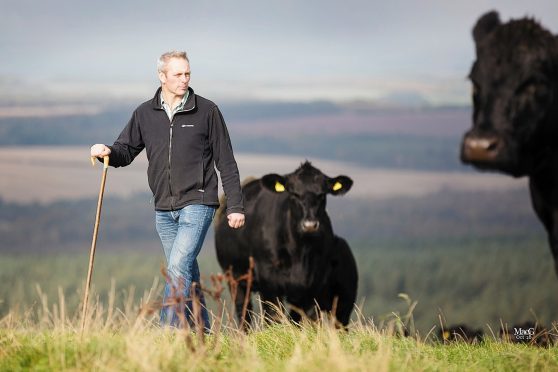The host of next month’s flagship beef industry event has condemned the government’s BeefEfficiency Scheme (BES) as a “fluffy load of rubbish”.
Speaking on his farm near Earlston in the Borders at a preview of the Scottish Beef Event, Douglas Stewart said he had not taken part in the BES despite it being potentially worth around £30,000 to his business over five years.
Mr Stewart runs a herd of 400 Aberdeen-Angus suckler cows as part of his mixed potato, arable and beef business and ranks in the top third of recorded Scottish beef herds. He said he had been carrying out most of the measures required by the BES as a matter of course for many years.
“I thought it was a load of rubbish. I could see what they were trying to achieve but it was all too rushed,” he said.
“And I didn’t like the five-year commitment to something so fluffy. I would rather use my own and my staff’s energies to be more efficient and concentrate on physical performance and running the business better.”
Pressure to sign up may be intensified on June 8 as Mr Stewart is likely to come face-to-face with a BES team when the Scottish Government mans a stand at the farm event in a further attempt to sell the scheme to the industry. A crowd of 3,000-5,000 beef farmers is expected.
Mr Stewart’s beef business, which he said is profitable in its own right, is fully integrated into his wider enterprise which covers 2,430 acres on three farms, including land rented for grazing and potatoes. He runs a closed herd and buys most of his bulls privately.
Male calves are kept entire and finished at 14 months as bull beef, achieving an average deadweight of 390kg from a largely silage-based diet which moves gradually to ad lib cereals.
Mr Stewart said: “People get hung up about bulls and argue that they’re not premium steers – but they perform for us. We get the weight, good grades, they’re efficient, they get away early and they use barley grown on the farm.”
The herd is spring calving, largely because the different enterprises share resources and staff are needed at harvest time. Mr Stewart said having the different enterprises led to reduced costs as machinery, overheads and cattle feed could be shared. Cattle also brought clear benefits for the arable enterprise as they provided dung and a grass rotation which led to higher organic matter content in soils.
Winter oats, winter wheat, winter barley and spring barley together with 350 acres of seed potatoes make up the rest of the business.
Farmers attending the event will be able to take trailer tours of the farm, watch demonstrations and stockjudging competitions, sit in on a seminar and visit trade stands.
The Scottish Beef Event takes place at Fans Farm, Earlston, on June 8.
